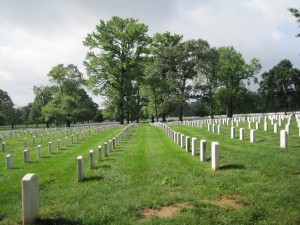
Memorial Day
Herman Melville’s novels are familiar to most high school students (or they used to be) but his poetry is another matter. I am guessing that, outside the literary world, most people are not aware he wrote poetry. This blogger made that discovery reading a WSJ review of a new multi volume Civil War history from the Library of Congress: The Civil War: Told by Those Who Lived it.
In 1866, as the nation made its fragile, anxious efforts at reconciliation after the Civil War Herman Melville published a sprawling book of poems, Battle Pieces, or Aspects of the Civil War. The collection contained more than 70 poems, and it attempted to do something rare in the literature of the period. Rather than engage in partisan celebration or denounced the enemy, Melville’s poetry captured America’s most bloody war in all its confounding totality. It presented dozens of aspects, or viewpoints – including those of Northerners and Southerners, soldiers and civilians – ultimately revealing that both sides were to blame.
In pursuit of the book I learned that Melville came to poetry late in life, and that he was a productive poet, albeit an unsuccessful one in his own time. I obtained a copy for my Kindle from www.gutenberg.org.
Although he wrote and published the poems after the war, they seem to have a greater immediacy, perhaps indicating the intensity of Melville’s emotions about the conflict. The overwhelming tone of the poems is somber, even regretful. They evoke the same feeling of melancholia that this writer experienced visiting Civil War battlefields.
Two poems are sampled here. The first describes an event unfamiliar to this reader. According to a newspaper account at the time:
“The Terrible Stone Fleet on a mission as pitiless as the granite that freights it, sailed this morning from Port Royale, and before two days are passed will have made Charleston an island city. The ships are old whalers and cost the government between $2500 to 5000 each. Some of them were once famous ships.â€
An Old Sailor’s Lament.
(December, 1861.)
I have a feeling for those ships,
Each worn and ancient one,
With great bluff bows, and broad in the beam;
Ay, it was unkindly done.But so they serve the Obsolete—
Even so, Stone Fleet!
You’ll say I’m doting; do but think
I scudded round the Horn in one—The Tenedos, a glorious
Good old craft as ever run—
Sunk (how all unmeet!)
With the Old Stone Fleet.An India ship of fame was she,
Spices and shawls and fans she bore;
A whaler when her wrinkles came—
 Turned off! Till, spent and poor,Her bones were sold (escheat)!
Ah! Stone Fleet.
Four were erst patrician keels
(Names attest what families be),The Kensington, and Richmond too,
Leonidas, and Lee:
But now they have their seat
With the Old Stone Fleet.To scuttle them—a pirate deed—
Sack them, and dismast;
They sunk so slow, they died so hard.
It turned out, the federal effort to block Charleston Harbor failed, making the event all the more poignant.
The next poem, although it refers to the prelude to a specific battle (also called The Battle of Leesburg), is a wistful account of the exuberance of young men marching off to war, innocent of the trials ahead.
Ball’s Bluff.
A Reverie.
(October, 1861.)
One noonday, at my window in the town,
I saw a sight—saddest that eyes can see—
Young soldiers marching lustily
Unto the wars,With fifes, and flags in mottoed pageantry;
While all the porches, walks, and doors
Were rich with ladies cheering royally.
They moved like Juny morning on the wave,Their hearts were fresh as clover in its prime
(It was the breezy summer time),
Life throbbed so strong,
How should they dream that Death in a rosy clime
Would come to thin their shining throng?Youth feels immortal, like the gods sublime.
Weeks passed; and at my window, leaving bed,
By night I mused, of easeful sleep bereft,
On those brave boys (Ah War! thy theft);Some marching feet
Found pause at last by cliffs Potomac cleft;
Wakeful I mused, while in the street
Far footfalls died away till none were left.
Some of Melville’s poetic illusions will challenge less classical vocabularies but if particular meanings elude, larger understanding does not.
Melville ends the book with an appeal to bury rancor on the battlefield and heal the divide in which so many of the nation’s youth are buried. The Civil War shaped America and we are still arguing about why it was fought. Its protagonists, Robert E. Lee and Stonewall Jackson on the South; Abraham Lincoln, and William Seward on the North, among others, remain larger than life in our collective memories. It was a very personal war. The blood was our blood shed on native soil. Even more tragic, the enemy was not some alien ‘other’ but spoke the same language, shared the same traditions, and as Martin has commented elsewhere, often had family members in common. It remains the deadliest war in the nation’s history, claiming an estimated 750,000 soldier’s deaths.

 The posts are coming!
The posts are coming!


1 comment
Thank you again! I enjoyed this very. The same with Martin’s Washington spy article. I read Melville in Highschool, but I have no idea what children are reading today. One can only hope some good literature.
[Reply]
Leave a Comment